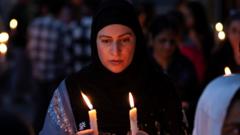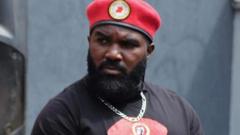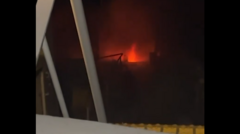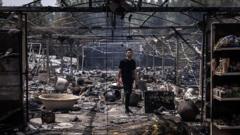The recent outbreak of violence in the Druze areas of Syria has raised alarm over the country’s ongoing instability, highlighting the challenges faced by the new authorities and the precarious positions of various religious minorities amidst external influences.
Renewed Violence in Syria’s Druze Regions Signals Ongoing Instability

Renewed Violence in Syria’s Druze Regions Signals Ongoing Instability
Escalating clashes in Syria showcase deepening fractures within the country’s fragile security landscape amidst international tensions.
Deadly confrontations in southern Syria have erupted once again, underscoring the country's frail security environment more than a decade after the fall of President Bashar al-Assad. Clashes involving Islamist factions, security forces, and Druze fighters were ignited near Damascus, prompting an urgent response from neighboring Israel, which conducted airstrikes to protect Druze civilians. The Israeli government has characterized its intervention as necessary to uphold the safety of the Druze community, which shares ties across the region, including in Lebanon and Jordan.
Amidst a backdrop of increasing sectarian divides, various factions remain embroiled in conflicts, leading to a devastating spiral of violence. The new authorities in Syria have pledged to restore stability and unity; however, skepticism lingers concerning their affiliations with radical elements, fueling further distrust among minority groups like the Druze and Alawites.
In recent violent encounters, reports have indicated a staggering toll, with over 100 lives claimed due to the clashes, predominantly from the Druze community. A significant portion of the casualties included both civilians and armed factions caught in the crossfire. The violence was purportedly triggered by inflammatory social media posts, showcasing the volatility of the current situation in Syria.
After intense fighting, ceasefires have been brokered, yet the underlying tensions remain palpable. Distrust festers between the Islamist-led authorities and the religious minorities, creating a precarious atmosphere potentiated by foreign interventions, particularly from Israel and Turkey, each vying for influence in the post-Assad landscape.
Israel's territorial maneuvers and military actions have been met with criticism from Damascus, although both sides appear cautious of escalating hostilities. Concurrently, Turkey's increasing involvement alongside its own geopolitical aspirations introduces another layer of complexity.
As the new Syrian leadership navigates these tumultuous waters, rebuilding a unified and stable state will require immense dedication and support from the international community, as well as a commitment to addressing the long-standing grievances of a populace torn apart by years of conflict. The road towards peace remains challenging, as hostile external and internal forces threaten to pull Syria back into chaos.


















